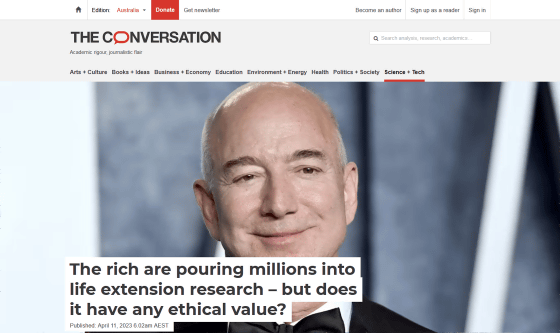What are the ethical issues related to 'developing life extension technology to live longer'?

Since ancient times, 'eternal life' has been a thirst for people who have acquired enormous power and assets. In modern times where science and technology have developed, it is a sufficiently realistic goal if it is about `` extending life '', OpenAI
The rich are pouring millions into life extension research – but does it have any ethical value?
https://theconversation.com/the-rich-are-pouring-millions-into-life-extension-research-but-does-it-have-any-ethical-value-201774

◆Isn't extending life just a matter of postponing death?
Some people who are skeptical about extending life expectancy believe that after all, human death is inevitable, and that extending life expectancy is just delaying death. There is also However, in response to this claim, Mr. Gyngell said, ``The problem with this idea is that ``all saved lives are only temporarily saved.'' ``Extending a person's life span by 10 years , is like saving a person from drowning only to die in a car accident 10 years later. I'm glad you saved a life,' he said.
Moreover, the most optimistic view is that if we extend our lifespan by 10 years, we might find a technology that will extend our lifespan by another 10 years in the meantime. Therefore, even a short-term extension of lifespan can be of great significance.

``Isn't immortality boring?
Some people are skeptical about extending lifespans, fearing that if they live a long life, they will one day get bored of living. Philosopher
`` Some philosophers have pointed out that human memory is error-prone, and that the same desires can resurface when we forget previous experiences,'' Gyngell said. 'Experiences reshape interests, and our categorical needs may evolve and continue to do so over the course of very long lives.' If these theories are true, life won't run out of projects and become boring, as Williams argues, as life gets longer.
Also, while immortality may cause project depletion, it may never leave projects worth wanting, if only by extending lifespans by a few decades. “Many people would say that 80 years is not enough time to pursue your potential,” Gyngell said. It is very welcome to load it.'

What if poor people cannot extend their lifespans?
One of the concerns about extending life expectancy is inequality due to the gap between rich and poor. Naturally, life-extending technology is likely to be expensive, and it's common knowledge that Silicon Valley billionaires can celebrate their 150th birthdays while the poor die at 70-80. may be targeted.
“This counterargument seems persuasive,” Gyngell said. ”, admitting that the issue will raise ethical debates. On the other hand, universal health insurance is the idea of ``promoting equality by improving the situation of the poor.'' It can also be thought of as the idea of 'promoting equality by taking away what might have been lost'.
'The ethical desirability of downgraded equality is unclear. The poorest people in Australia are

◆What is the real problem of life extension technology?
So far, Gyngell has discussed the ethical issues surrounding life extension technology in a positive light, but points out that there is one serious ethical objection that applies to extreme life extension cases. He argues that if ordinary humans live an extremely long life, the fitness of the population will decline, leading to social stagnation.
For example, even a modest increase in life expectancy can dramatically change the population pyramid, dramatically increasing the number of people that the planet's resources need to feed. Birth rates need to be lowered to prevent overpopulation, and generational change will be much slower. A 2015 study found that social stagnation due to declining birth rates has problems such as `` increasing vulnerability to the threat of extinction '', `` jeopardizing individual well-being '', and `` hindering moral progress ''. pointed out.
Various fields in the world benefit greatly from the regular arrival of younger generations, and the generational change promotes technological innovation and updating of social concepts. However, with too many elderly people remaining, people with confirmation bias in scientific knowledge and moral beliefs and people who are stuck in old ideas may continue to stay in positions of power. .
'Our society's moral code seems wildly wrong in at least some respects,' Gyngell said. In addition, we believe that past societies made catastrophic mistakes, and a delayed generational change may delay the time for us to recognize and correct our moral wrongs. Especially the issues that we haven't seen yet.'

Related Posts:
in Note, Posted by log1h_ik







